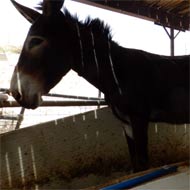
The Donkey Sanctuary is partnering up with scientists from the University of Milan for a research project to improve the lives of dairy donkeys.
As the donkey milk farming sector grows - particularly in parts of continental Europe - so do concerns for the welfare of the animals involved.
Researchers hope to learn more about farming protocols and drive consumer demand for more responsible practices.
So far, they have visited eight different farms, who took part on a voluntary basis.
The team are gathering information in the following areas:
- Key requirements of, and demand for, donkey milk
- The husbandry of donkey stallions as studs and those surplus to breeding
- Final destinations of donkeys when they leave the milk farms
They also carried out welfare assessments using donkey indicators developed in a recent EU-funded project - Animal Welfare Indicators.
Commenting on the research, the sanctuary's director of care and welfare Andy Foxcroft, said: "To better understand the situation of donkeys used for milking, their offspring and the jacks used for breeding we are supporting a yearlong research project looking at welfare, legislation and safety issues of milk farming in Italy."
Image courtesy of the Donkey Sanctuary



 The RCVS has announced a new version of its 1CPD mobile app, with enhanced features for veterinary surgeons and veterinary nurses to record their continuing professional development.
The RCVS has announced a new version of its 1CPD mobile app, with enhanced features for veterinary surgeons and veterinary nurses to record their continuing professional development.